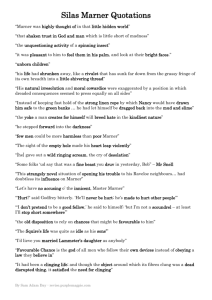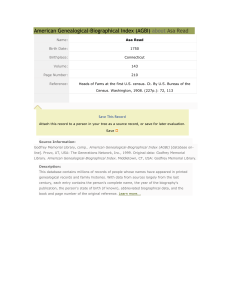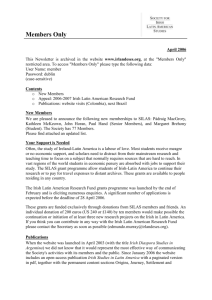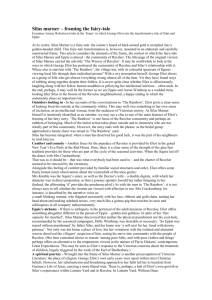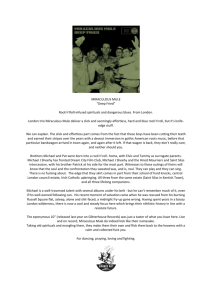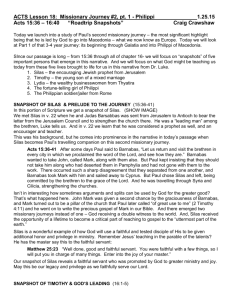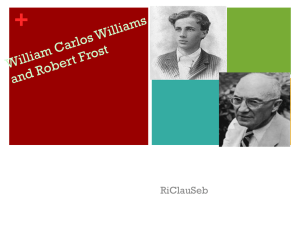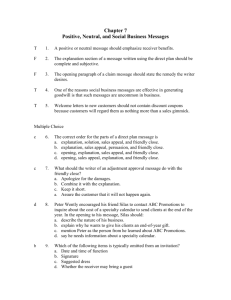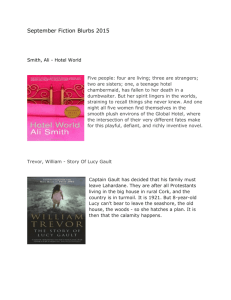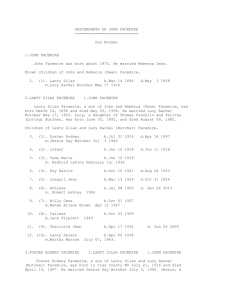Silas Marner Study Guide Chapter 1 Vocabulary accession – an
advertisement
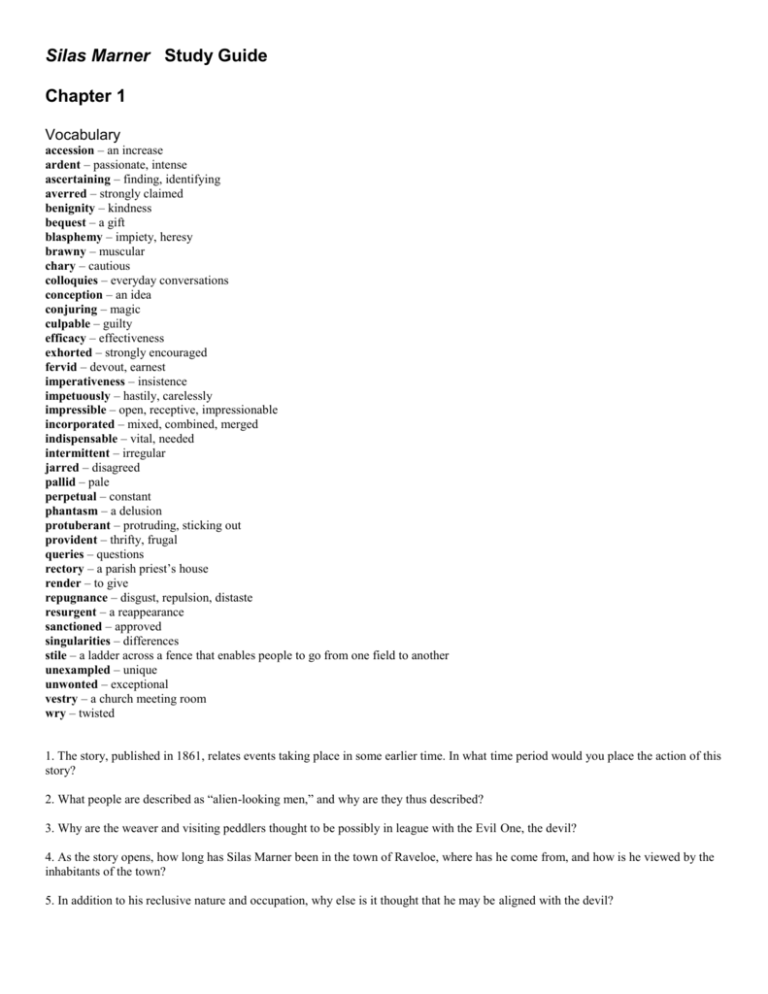
Silas Marner Study Guide Chapter 1 Vocabulary accession – an increase ardent – passionate, intense ascertaining – finding, identifying averred – strongly claimed benignity – kindness bequest – a gift blasphemy – impiety, heresy brawny – muscular chary – cautious colloquies – everyday conversations conception – an idea conjuring – magic culpable – guilty efficacy – effectiveness exhorted – strongly encouraged fervid – devout, earnest imperativeness – insistence impetuously – hastily, carelessly impressible – open, receptive, impressionable incorporated – mixed, combined, merged indispensable – vital, needed intermittent – irregular jarred – disagreed pallid – pale perpetual – constant phantasm – a delusion protuberant – protruding, sticking out provident – thrifty, frugal queries – questions rectory – a parish priest’s house render – to give repugnance – disgust, repulsion, distaste resurgent – a reappearance sanctioned – approved singularities – differences stile – a ladder across a fence that enables people to go from one field to another unexampled – unique unwonted – exceptional vestry – a church meeting room wry – twisted 1. The story, published in 1861, relates events taking place in some earlier time. In what time period would you place the action of this story? 2. What people are described as “alien-looking men,” and why are they thus described? 3. Why are the weaver and visiting peddlers thought to be possibly in league with the Evil One, the devil? 4. As the story opens, how long has Silas Marner been in the town of Raveloe, where has he come from, and how is he viewed by the inhabitants of the town? 5. In addition to his reclusive nature and occupation, why else is it thought that he may be aligned with the devil? 6. We are told that “Marner’s inward life had been a history and a metamorphosis.” What has his life been filled with before he comes to Raveloe? 7. What happens that changes Marner’s life? 8. Before the robbery, how has his “friend” William Dane turned Marner’s fiancée and some others against Silas? 9. When Silas says that he is innocent and that Dane is the last one to have seen the knife that is used to pry open the drawer, how is Marner’s guilt proven? What does this method suggest? 10. A month later when Silas’ fiancée marries Dane, Silas leaves Lantern Yard. Describe the kind of person Silas has become when he leaves Lantern Yard. Chapter 2 Vocabulary abstractions – intangible concepts amulet – an object used as a charm against evil, a charm benumbed – cold, frozen discourse – a discussion dispensations – commands and orders of a religious system divinities – higher powers, gods erudite – scholarly, brainy, cultured hedgerows – a row of brushed forming a hedge inanity – meaninglessness, absurdity incipient – developing, beginning loam – a mixture of sand, clay, silt, and organic matter used to grow seeds physic – medicine pulsation – a rhythm, beating revelry – entertainment, celebration sullenness – grouchiness, a bad mood unpropitious – hostile, unfriendly unremittingly – without stopping, ceaseless, continually 1. In the first two paragraphs of this chapter, what contrast is drawn? 2. Do you notice that God is referred to in both Chapters 1 and 2 but rarely by name? What are some of the terms used? 3. In Raveloe, Silas throws himself into his work. What is he, as he weaves, compared to? What literary term is employed? 4. Why has he “reduced his life to the unquestioning activity of a spinning insect”? 5. After he has been paid by Mrs. Osgood, how do we see that Silas’ view of money has changed? 6. When Silas helps Sally Oates, he has a good feeling and thinks perhaps he might rejoin humankind. How does this reaction of the people of the village drive him even deeper into himself? 7. Why does Silas not take the opportunity to pretend to have magical powers and sell the people magic tokens and potions? 8. We are told that as more money comes in, Silas spends less because he has become a true miser. Although he hides his money, why is it said to be unlikely that any local will rob him? 9. The first two chapters are told in a flashback. How does this technique work in Silas Marner? 10. At the end of Chapter 2, what indicates that the action is moving into the present time? Chapter 3 Vocabulary annulling – destroying arrears – an unpaid debt chines – meat that contains part of the backbone contingent – conditional cupidity – greed, desire distrain – to seize (property in order to make the person pay his debt) fetters – bonds, chains gratuitously – pointlessly hallowing – holy, revered husbandry – farming incalculable – immeasurable irresolution – uncertainly, indecision laudanum – an opiate multitudinous – many different oblivious – unaware orts – scraps pathos – an emotion, feeling pillions – extra padding (for a rider behind the saddle) placably – tolerantly pliant – flexible, malleable prosaic – boring, mundane recommence – to re-start rumination – mediation, reflection, pondering tacit – silent, implied, unspoken trumps – advantages unctuous – fatty, oily vicinage – an area wainscoted – expensively wood paneled 1. The author opens this chapter by describing the lives of Squire Cass and the other wealthy landowners in the area. What seems noteworthy about their lives? 2. We are told that because the Squire’s wife died long ago, the two boys have been raised without the wholesome influence of a mother. As a result, how have they turned out? 3. How is Dunstan Cass presented, and how does he get his brother to supply the rent money for an unreliable tenant? 4. Godfrey, realizing that the money has to be paid or his father will be told of the situation, considers telling his father the whole story. What keeps him from doing so? 5. If their father throws Godfrey out, will Dunstan’s position within the family improve? 6. Who is Nancy Lammeter, and what do we know about her? 7. What does Dunstan suggest that they do in order to get the money to pay their father? Chapter 4 Vocabulary cajoling – coaxing, convincing coppice – a group of small trees or shrubs divined – knew, discerned, figured out felicitous – well-timed; agreeable jacks – devices used to turn the spit over a fire loom – a device used to make thread or yarn into cloth surplus – extra, left-over treadles – pedals unprecedented – different, unheard of 1. As Dunstan rides to the hunt, he passes Silas’s cottage. The idea comes to him that Godfrey might borrow the money from Silas and, thereby, not have to sell the horse. Why does he reject this idea? 2. Three times in this chapter, Dunstan refers to himself as “a lucky fellow.” After the accident with the horse, why does he still think of himself as lucky? What does this say about him? 3. Although Bryce offers 120 pounds for the horse, why does the sale never go through? 4. As he walks toward his home, what does Dunstan plan to boast about to the crowd that hangs out in the Rainbow Inn? 5. What leads Dunstan to Silas’ door? 6. At the end of this chapter, what does Dunstan take when he leaves Silas’ house? Chapter 5 Vocabulary condescension – disdain, superiority contemptuous – arrogant, insulting conviviality – companionship, good-fellowship dissipated – broken up, separated imminent – near, coming soon presentiment – fear, expectation prostration – submission, compliance, surrender retarding – stopping, hindering superfluous – extra, excessive wrought – worked 1. How is the fact that Silas has left his house unlocked while running an errand made believable? 2. Paraphrase the following: “The lapse of time during which a given event has not happened is, in this logic of habit, constantly alleged as a reason why the event should never happen, even when the lapse of time is precisely the added condition which makes the event imminent.” 3. What sometimes makes the author’s long abstract passages easier to decode? 4. What is Silas’ first reaction when he discovers his loss? Why is he comforted when he comes to believe a thief took the money? 5. Why does Silas run to the Rainbow Inn? Chapter 6 Vocabulary analogical – a statement based on a comparison or analogy candor – straightforward honesty conciliatory – peace-making, calming epigram – a witty comment, joke farrier – a blacksmith fustian – a type of coarse cotton/linen material jocose – jolly, humorous, comical lief – willingly, readily piquant – appealing, interesting precedent – prior examples or decision propriety – appropriateness, correctness rector – a clergyman, parish priest requisition – in need throstle – a type of songbird (thrush) wheelwright – a person who builds and repairs wheels 1. Little happens to advance the plot in this chapter. Why do you suppose the author includes it? Chapter 7 Vocabulary adjuring – questioning apparition – a ghost compunction – regret, uneasiness disincline – unwilling indisposed – unwilling oracular – wise, prophetic par – an average, norm pregnant – meaningful, significant preternatural – unusual, supernatural resolutely – deliberately, intentionally superlatively – very, highly, especially surplice – a robe (worn in church services) torpid – dormant, inactive transient – temporary, changing 1. What is the first reaction of those in the inn when they see Silas in the doorway? 2. Silas first accuses Jem Rodney of stealing his gold. Why does he later apologize to Jem after Mr. Macey’s comment? 3. What might the following comment, particularly the portion after the colon, foreshadow? (particularly, the last sentence) “Our consciousness rarely registers the beginning of a growth within us any more than without us; there have been many circulations of the sap before we detect the smallest sign of the bud.” 4. How does this chapter end? Chapter 8 Vocabulary ascertained – determined boded – predicted clairvoyant – a psychic eliciting – drawing out glazier – a person who cuts and fits glass for windows and doors impious – unholy implacable – merciless, inflexible impregnated – filled, loaded irresolution – indecision malignity – cruelty, ill will pretenses – tricks, deceits repudiated – rejected surmise – an assumption tinder box – a metal box that holds materials for starting a fire 1. Why, on the night of the party, is Godfrey not surprised that Dunstan has not come home? 2. Why is the peddler suspected of being a thief? 3. What opinion does Godfrey hold about the theft? 4. After a couple of days pass, where does Godfrey think Dunstan may be? 5. After resolving to go to Batherley, how does Godfrey find out what happened to Wildfire? 6. Before he goes to bed that evening, what does Godfrey resolve? 7. In the morning what change of mind takes place? Chapter 9 Vocabulary acuteness – sharpness, clarity, insight calculable – predictable deprecated – condemned, belittled duplicity – deception eatables – food entail – a legal inheritance to the next male heir errant – wrong evasion – avoidance gentilities – sophistication, refinement homage – to honor, show loyalty inversion – a reversal lieve – to prefer mitigated – eased, calmed ostler – a caretaker of horses ponderous – awkward, clumsy, heavy presupposition – an assumption, belief prevarication – lying prudence – practicality; wisdom slovenly – dirty, messy, sloppy unmodified – unchanged, unaffected 1. How does the Squire behave towards his sons? 2. Why is the Squire upset that peace is talked about in the paper? 3. Why do you suppose it is mentioned that the squire gives his dog as much meat for breakfast as a poor man may have for his holiday dinner? 4. Godfrey, not having any other out, is forced to tell his father about the missing 100pounds rent. What is his father’s reaction? 5. Whom does the father blame for the fact that Godfrey is “a shilly-shally fellow”? 6. What blame does Godfrey lay at his father’s feet? 7. In the last paragraph of this chapter, the author discusses chance and fortune. What is her point? Chapter 10 Vocabulary adulterated – contaminated, changed for the worse appropriating – acquiring, taking, claiming capacious – broad, open cessation – an ending collateral – additional comporting – behaving deride – to insult, mock diffidence – hesitance, reluctance discriminated – distinct, different discursive – rambling dubiety – uncertainly egoism – self-centeredness exhortation – advice, encouragement explicable – explainable imperceptibly – unnoticeably importunate – harassing, troublesome injurious – hurtful, damaging irascibility – irritability paltry – cheap, low-class pettitoes – pig’s feet (as food) preëminently – most outstandingly, predominantly prescriptive – accepted requisite – required rivulet – stream scrupulous – careful, precise susceptible – subject, vulnerable venerable – aged, honored, respected vixenish – argumentative wall-eyed – eyes going different direction 1. Why is the connection not made between the robbery and Dunstan’s absence? 2. What effect has the robbery had on Silas? 3. What effect has the robbery had on Silas’ neighbors? 4. For what reason does the author say the following: “...one reason why we are seldom able to comfort our neighbors with our words is that our good will gets adulterated, in spite of ourselves, before it can pass our lips.” 5. What do both Mr. Macey and Mrs. Winthrop suggest would be a big help for Silas? 6. In what way may they be correct? 7. Why is Silas unable to comprehend what his comforters are saying? 8. The author tells us that Silas has changed since he was a young man. What does the quote below imply about Silas at this point? “Nobody...knew that he was the same Silas Marner who had once loved his fellow with tender love and trusted in an unseen goodness.” 9. Why is New Year’s Day a big day at the Cass house? 10. The conversation which takes place in Godfrey’s mind with Anxiety reveals the troubling thoughts he has. When Anxiety says, “But money is wanted in another quarter,” to whom or what could the comment refer? Chapter 11 Vocabulary aberration – difference; departure adroit – skilled apothecaries – pharmacists bate – to give away carping – complaining, disapproving, fretting charter – a document creating and establishing the rules of a town coiffure – a hairstyle colic – an abdominal pain complacent – indifferent deference – courtesy disavowed – claimed exiguity – a lack, deficiency facsimile – a reproduction, copy fallible – imperfect formidable – tremendous grimace – a painful look hale – healthy impious – disrespectful incongruous – irregular, inconsistent indiscriminately – randomly induced – tempted, convinced inherently – basically, mostly, essentially insensible – unaffected, indifferent, unconcerned inspirit – to liven, refresh, awaken irreligion – irreverence, dishonor, hostility toward religion judicious – careful, cautious levity – absurdity, frivolity memento – a reminder nattiness – neatness patronage – support patronizing – favoring, indulging from a position of superiority pettishly – with ill-temper precedence – a priority, first place, first turn rayed – spread, shone, beamed scarify – to scratch, rip sodger – soldier solicitously – attentively, carefully tit for tat – one act for another tucker – a piece of lace worn about neck and shoulders variegated – streaked with different colors veracity – honesty vindication – explanation, defense vivacious – lively vouchsafed – given, granted, secured 1. Why is Nancy upset by the marked attention Godfrey shows her? 2. For what reason, even though he is the son of a squire, will she not agree to marry him? 3. What contrast is drawn between the two Gunn sisters and Nancy? 4. What do we know of Nancy’s sister Priscilla? 5. How do we learn that Nancy does have strong feelings for Godfrey? 6. When the Squire links the names of Godfrey and Nancy romantically, what do we learn about Mr. Lammeter’s view of the relationship? 7. Some of the townsfolk are permitted to sit on the sidelines and watch the dancing. What do we learn is Mr. Macey’s opinion of Godfrey? Chapter 12 Vocabulary conjectures – conclusions, guesses, assumptions degradation – shame futurity – future events or possibilities indolence – laziness presiding – ruling self-reproving – self-disgust, acknowledging one’s guilt torpor – unconsciousness vindictiveness – desire for revenge 1. Why has Molly chosen this night to come and confront Godfrey? 2. Molly blames Godfrey for her wretched condition, but what is Molly’s real problem? 3. How does the young child end up sitting in Silas’ house in front of the fire? 4. What is Silas’ reaction when he sees the blonde hair of the child? Chapter 13 Vocabulary advent – an entrance duplicity – deceit eglantine – a type of rose with bright pink blossoms emaciated – skeleton-like, wasted façade – a false appearance, false-front freaks – unusual behaviors lithe – flexible, graceful placably – tolerantly profligacy – corruption, evil renunciation – relinquishment, giving up, self-denial subterfuge – an excuse, deception unmeritorious – undeserving, without worth vagrant – a delinquent, beggar volatile – inconsistent, unstable, temperamental whist – a card game 1. As Godfrey stands admiring Nancy from a distance, we are told that his eyes “encountered an object as startling…as if it had been an apparition from the dead.” How do we know that the sentence refers to the appearance of the child and not Silas? 2. If someone had looked at him, how would he have given himself away? 3. What is Godfrey’s biggest terror at the moment about the woman in the snow? 4. Godfrey, wearing only his thin shoes, goes to fetch Mrs. Winthrop. As they walk to Silas’ cottage, Dolly says that Godfrey has a good heart. We are told that Godfrey weighs his alternatives. What are his alternatives, and how do we know which alternative he will choose? 5. Before leaving, why does Godfrey take one quick look at the dead woman? 6. The narrator tells us that in sixteen years Godfrey will tell the full story of that night and reveal his secret. Why do you suppose he will do that so much later? 7. Why does Silas think he has a right to keep the child? Chapter 14 Vocabulary aberration – an abnormality, difference, irregularity articulate – able to be understood attendant – accompanying communion – an association, intimacy compacted – filled tightly contention – a disagreement, argument conveyed – communicated derived – learned, obtained, procured descrying – seeing, finding, discovering disposition – an inclination, tendency docilely – humbly, submissively dormant – sleeping, inactive effectual – effective, useful enfeebled – run down, weak imperatively – immediately, insistently, urgently iterated – repeated moithered – confused novelty – a surprise, new idea/event penal –corrective, disciplinary perturbed – worried, nervous, anxious propensities – inclinations to act in a certain way propitiatory – appeasing, placating stupefied – frozen, numbed, inactive traversed – crossed vicariously – indirectly experienced 1. We are told that the death of Molly brings changes in many lives. What changes occur in Silas’ life as a result of taking in Eppie? 2. What is the reason for the changed attitude of the people toward Silas? 3. Although Dolly helps Silas quite a bit, why is Silas reluctant to let Dolly do too much? 4. What is Silas’ reaction when Dolly suggests that the child be christened? 5. Does getting involved with the church make Silas more religious? 6. A comparison is made between Silas’ gold and Eppie. What is the point of this comparison? 7. Paraphrase the following passage in your own words. “As the child’s mind was growing into knowledge, his mind was growing into memory; as her life unfolded, his soul, long stupefied in a cold, narrow prison, was unfolding, too, and trembling gradually into full consciousness.” 8. Why does the author devote so much time to Silas’ attempt to discipline Eppie? Chapter 15 Vocabulary incurring – stirring up, calling upon oneself jocosely – humorously 1. Godfrey, on occasion, gives Silas money for Eppie, but he does not do a great deal for her. What holds him back from doing more for her? What does he promise himself in this regard? 2. The author then alludes to a once famous tale about a person who has a ring that pricks his finger whenever he neglects his duty to pursue his desires. Paraphrase the author’s comment in this passage: “I wonder if it pricked very hard when he set out on the chase, or whether it pricked but lightly then and only pierced to the quick when the chase had long been ended, and hope, folding her wings, looked backward and became regret?” 3. What is the point of the ring story? What might it foreshadow? 4. At the end of this chapter, we are told that Godfrey thinks of his future life with Nancy and their children. Then, he remembers the other child, Eppie. Some critics think this last sentence is said sarcastically by the author. What is your opinion; is it sarcastic or not? Chapter 16 Vocabulary cadence – a rhythm chastise – to correct, beat down, punish cogent – forceful, strong coquetries – flirtations, teasing desisting – stopping, pausing emphatically – decisively fervor – intensity fetishism – attachment to, high regard for fustian – a cotton and linen blend half-abstractedly – preoccupied ingenuously – honestly, willingly, frankly invariable – normal, unavoidable parried – deflected, avoided recurred – came back to, returned to remonstrate – to challenge, dispute reticence – a restraint, hesitance roguish – coy, playful rove – to wander rusticity – countrified, provincial, rural sages – wise people sanctioned – approved unvitiated – pure vainly – uselessly, unsuccessfully veracious – honest, truthful vexed – angered, upset, irritated 1. Chapter 16 opens Part II of the novel sixteen years later. Why do you suppose it opens with a church scene? 2. We are told that Godfrey has not changed much in features, but of Nancy we are told “The firm yet placid mouth, the clear, veracious glance of the brown eyes speak now of a nature that has been tested and has kept its highest qualities.” What does that sentence suggest? 3. When we see Silas and Eppie come out of church, what contrast is drawn between them? 4. Eppie is the blossom of youth, and from her conversation with Silas, we learn she wants to plant a garden. We then learn that Aaron Winthrop, whose occupation is that of gardener, wants to marry Eppie. What is Silas’ response to that information? 5. What has Godfrey’s relationship with Silas and Eppie been over the years? 6. Flower, insect, and animal imagery are used frequently in this novel. What is the point in the description of the dog and cats in the house? 7. Change is mentioned a great deal in this chapter. What is the one thing that Silas will not change in the house? What does it represent to Silas, and what is it a symbol of for the author? 8. In what way has Silas changed outwardly, but not necessarily inwardly? 9. What does the comment below by Dolly mean? But what lies upo’ your mind—it’s this, Master Marner: as, if them above had done the right thing by you, they’d never ha’ let you be turned out for a wicked thief when you was innocent. 10. What answer does Dolly come up with to the question of evil? 11. What is Silas’ response? 12. To what does the author attribute Eppie’s delicate nature? 13. When Silas asks Eppie if she wants to marry Aaron, what does Eppie answer? How would you characterize Eppie’s feelings for Aaron? Chapter 17 Vocabulary adherence – acceptance, obedience averse – disinclined, reluctant blighting – destructive calamities – disasters, catastrophes effaced – erased elude – to avoid eminently – extremely epoch – an era, period of time fallacy – an error, wrong concept filial – relating to children fleckered – flecked, spotted, speckled gig – a carriage impetuously – impatiently incitement – encouragement injunction – a request, instruction irreparable – irretrievable, permanent peremptory – dictatorial privation – a hardship rectitude – correctness remonstrances – protests scruple – a qualm scrutinize – to examine singular – odd, curious solicited – enticed soliloquy – a mental conversation tenacity – a resolve, firmness; strength transported – deported (sent to another country for crimes) unobtrusive – not obvious; inconspicuous unvaryingly – consistently 1. All the action in this chapter takes place in the Cass house. What changes have taken place in this house? 2. How has Mr. Lammeter changed? 3. Has Priscilla changed? Does she seem bitter towards men? 4. What has been the cause of some tension in the Cass household? Why has Nancy objected to Godfrey’s request of adopting Eppie? 5. What do we learn of the couple’s own attempt to have children? How does Godfrey view the situation? 6. In his plans to adopt Eppie, Godfrey still is not going to reveal that he is her father. What makes him think he can disrupt Silas and Eppie’s life whenever he chooses? 7. Nancy realizes how empty life seems to Godfrey because he has no child. She believes that the reason for Godfrey’s unhappiness is her refusal to adopt a child. Explain Eliot’s following comment in this context. I suppose it is the way with all men and women who reach middle age without the clear perception that life never can be thoroughly joyous; under the vague dullness of the gray hours, dissatisfaction seeks a definite object, and finds it in the privation of an untried good. 8. This chapter ends on an ominous note. What has the maid told us is happening outside? Chapter 18 Vocabulary augured – predicted, foretold comparative – relative exerted – tried, put forth indignation – righteous anger, crossness refrained – stopped, quit suspended – stopped momentarily 1. When Godfrey comes home, what news does he give Nancy? 2. Why does Godfrey then go on and reveal his secret marriage and his relationship to Eppie? 3. In the earlier chapters, Godfrey hopes for the best; that is, he hopes that chance and fortune will come through for him and save the day. Now, however, he seems to believe that not chance nor fortune, but God’s will acts on our lives. How do you account for this change in thinking? 4. Godfrey expects Nancy to be very upset with him and possibly leave the house and go to her father’s house. How does she respond? 5. If they had adopted Eppie when she was four, what turn would the plot have taken? Given the possible scenarios, is the author making some comment on life and a person’s destiny? Chapter 19 Vocabulary banished – cast out beholden – indebted cleave – to cling definiteness – assuredness, confidence florid – ruddy, healthy-looking obliged – obligated penitence – remorse, regret ponderingly – thoughtfully previsions – guesses proposition – a plan, suggestion transfiguration – a change 1. In this chapter, as she does elsewhere, the author shows herself to be a keen observer and commentator on people and their behavior. In the first paragraph, what situation is she commenting on? 2. What does Eppie believe would have happened to her if Silas had not taken her in as a child? 3. Having gotten his money back, does Silas believe he will once again be a miser? 4. Godfrey decides that it is best not to mention right away that he is Eppie’s father. How does Godfrey approach the topic of adoption? 5. When Eppie mentions the only need they have is for a garden, why do you suppose Nancy promptly mentions her own garden? 6. After Eppie turns down the adoption offer, Godfrey blurts out the truth; she is his natural daughter. What line of reasoning does he then pursue to convince Silas to give up Eppie? 7. When Silas leaves the decision to Eppie, what is her response? Do you find her answer believable? Given the opportunity in front of her, do you think she makes a wise choice? Chapter 20 Vocabulary industrious – diligent, focused repose – to rest shirked – avoided 1. As you read this chapter, what is your feeling about Godfrey? 2. Why does Godfrey decide not to make public the fact that he is Eppie’s father? How does Nancy feel about his decision? 3. In making a closure on that part of Godfrey’s life, how may it change his future? 4. How does he view Eppie’s rejection of him? Chapter 21 Vocabulary agitation – an annoyance attendant – present certitude – an assurance, truth stifled – suffocated (closed in without fresh air) trusten – trust 1. Why does Silas want to return to Lantern Yard? 2. Although eager to make the trip, what is Eppie’s reaction to the city? 3. When they get to the Lantern Yard section of the city, what is Silas’ reaction to the old neighborhood? 4. In the last part of this chapter, Dolly and Silas talk about the dark and the light. What do the dark and the light refer to? Conclusion Vocabulary lichen-tinted – moss-colored premeditated – pre-planned quavered – shaky, wavering sentiment – an opinion, outlook 1. For Eppie’s wedding, Godfrey adds a room to Silas’ house; he also buys Eppie’s wedding dress and pays for the wedding feast to be held at the Rainbow. Given these facts, on the day of the wedding, why is he out of town? Why do you suppose he cannot make the wedding? 2. In the final scene, Aaron, Eppie, Silas, and Dolly have walked back to the cottage before going to the Rainbow. Ben Winthrop has stopped off at the Rainbow where everyone will meet later. Considering Eppie’s last line, what do you suppose Eliot is suggesting?
